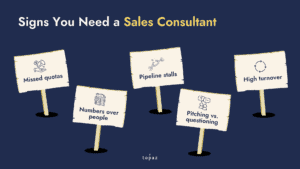Sales is a world where good salespeople and their intentions matter more than anything else. Customers can smell a scammer from a mile away and don’t respond favorably to the traditional pitch-and-tell approach. They won’t hesitate to take their business elsewhere.
In this article, we wanted to shake things up.
Together, we’ll explore how good intentions can make all the difference in sales. We’ll also expose those who give sales a bad name and show you how to avoid being one of them.
Keep reading if you’re ready to step up your game and become a successful salesperson or sales manager with integrity. But be prepared: We’re not here to sugarcoat anything. It’s time for some real talk about what it takes to succeed in sales without resorting to shady tactics.
Why Good Intentions Are Key to Successful Sales
In sales, your intentions matter more than anything else.
If you’re only focused on making a quick buck, customers will see right through you and won’t trust you enough to do business with you. Someone with bad intentions in sales will resort to manipulative tactics and tricks to make a sale, regardless of whether or not it’s the right product for the customer. They prioritize their profits over their customers’ needs and interests, making them untrustworthy and likely to damage their reputation in the long run.
On the other hand, if you have good intentions and your goal is to help customers discover pain, solve their problems, and meet their needs, they’ll be much more likely to trust you and become loyal customers. Customers can tell when someone genuinely cares about their needs versus someone just trying to make a sale. That’s what separates a Buyer Facilitator from a traditional salesperson.

When you approach sales with good intentions, building rapport and establishing trust with potential customers is more effortless — creating a foundation for long-term relationships built on mutual respect and value, not just money.
The High Cost of Bad Intent in Sales
One way we’d qualify someone as a “bad” sales hire is if they had bad intentions, and making a wrong hiring decision can cost organizations exorbitant amounts of money. Have you made a bad hire before? I get it — we all have — and you know how difficult it can be to clean up the mess afterward.
When salespeople have bad intentions or use shady tactics, it can lead to severe consequences for themselves and the company they represent. Not only will customers lose trust in them, but word of mouth can spread quickly through social media platforms or search engines, leading to negative reviews and damaging the company’s reputation.
Moreover, while using bad intent in sales may bring short-term gains, it will harm the business’s long-term growth because customers will be less likely to return or refer you. Companies can’t build a sustainable business model without repeat customers and will most likely flounder.
Satisfied customers become repeat customers, which is what every business wants.
How to Spot Someone With Bad Intentions: Red Flags to Watch For
Scammers and people with bad intentions exist in all professions, including sales. They often use high-pressure tactics like creating scarcity or urgency around an offer or product to create impulse purchases. Using false information or promising unrealistic results to get people to buy is also something you’ll often run into.
Believe it or not, buyers will sniff out the bad intentions quicker than expected. Trust me; they’re not stupid. They see right through exaggerated promises or a lack of transparency in the sales process. If you’re not asking any questions and bulldozing through the process to get a quick “yes,” you’ll lose almost every time.
Your goal should be to have a team of honest, trustworthy, and committed salespeople who do what’s best for your customers and your company. To uncover bad behaviors in your sales team,
Watch out for red flags
• Making unrealistic promises or claims.
• Implementing manipulative tactics or pressure tactics.
• Focusing too much on making a sale rather than meeting the customer’s needs.
• Using language that is aggressive, condescending, or disrespectful.
• Not communicating openly and honestly with potential customers.
When hiring sales candidates, it all starts with their hearts. The words that are said reflect not only their heart but, of course, their intentions and beliefs (both self-limiting and empowering). To screen for intent in your sales hiring process, a question to ask is, “Why are you in sales”? In their answer lies intent and ultimate purpose.
Don’t get us wrong — selling a product or service is challenging, so we understand why it can be tempting to use the wrong tactics or hire too quickly. Focusing on good intentions makes being a salesperson easier and more enjoyable in the long run. That’s what we call a win-win situation!
Expand your sales expertise and keep your skills sharp.
Sign up for the quarterly newsletter – Topaz Sales Digest
Avoiding the Dark Side of Sales: Tips for Staying True to Your Values
It’s easy for salespeople under pressure from management or struggling financially to resort to unethical tactics like lying or misleading potential clients. And doing so could damage their careers and reputations irreparably. The long-term consequences are not worth the short-term gains. Salespeople need to internalize that to fend off the temptations that arise from pressure. Sales professionals should always strive to maintain ethical values by setting realistic goals and being honest about what they can deliver while avoiding pressure from others that would cause them otherwise.
Here are a few tips for staying true to your values
• Be honest and transparent with customers about the capabilities of your products or services.
• Don’t make promises you can’t keep.
• Ask about and listen to customer needs.
• Respect the customer’s time –- avoid unnecessary conversations and sales pitches.
• Know when to say “no” if a customer request is unreasonable.
• Focus on building trust and relationships with customers.
Adhering to ethical standards will help you build trust and credibility with customers, which leads to lasting relationships and repeat and referral sales.
Building Trust and Loyalty Through Genuine Intentions
Building trust takes time and a concentrated effort, but it’s worth it because loyal customers refer new clients back to your business.
Rather than trying to build trust by spewing out endless facts, benefits, statistics, and features of your product or service, ask good and tough questions to learn about your customers and get to the truth. Don’t buy into the misconceptions; ask your prospects as many questions as you need. While the truth may not be what your prospect or customer wants to hear, it’s still essential that you tell it.

Let them know you are there to solve their problems and make their pain go away, not just to make a sale. After learning your customer’s expectations, demonstrate your commitment to customer satisfaction and quality service by going the extra mile whenever possible, but be efficient with both parties’ time. Follow up frequently with customers to ensure their needs are met, and the product works as promised. Listen without interrupting and show empathy.
By focusing on your customer’s needs, you can establish a strong foundation of trust that will be the cornerstone of a long-term relationship.
Lead With Good Intent, and the Sales Will Come
Customers will see right through you if you’re only focused on your own gain. They’ll know you don’t care about their needs or want to solve their problems. And let me tell you something — they won’t give you their business.
At the end of the day, leading with good intent should be non-negotiable for anyone in sales. This is the most powerful and effective way to sell more products and services to highly valued customers in the shortest amount of time to make the most sales. It’s not just about closing deals — it’s about developing relationships built on mutual respect and value. Disrupt the industry by leading with integrity and putting your customers first. Hear me loud and clear — the sales will come.






